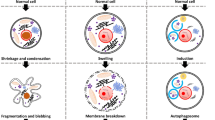Abstract
Apoptosis or programmed cell death (PCD) is a physiological process critical for organ development, tissue homeostasis and elimination of defective or potentially dangerous cells in complex organisms. Apoptosis permits cell death without a concomitant inflammatory response in the surrounding tissues. The process of apoptosis depends on the reception of multiple extracellular and intracellular signals, integration and amplification of these signals by second messengers and finally, activation of the death effector proteases. Defects in control of apoptotic pathways may contribute to a variety of diseases including cancer, autoimmune and neurodegenerative conditions and AIDS. While many components of the regulatory network controlling apoptosis have been defined, the mechanisms of action and patterns of interaction of these factors remain controversial. This article summarizes some of the known aspects of signaling pathways involved in apoptosis.
Similar content being viewed by others
Author information
Authors and Affiliations
Rights and permissions
About this article
Cite this article
Dragovich, T., Rudin, C. & Thompson, C. Signal transduction pathways that regulate cell survival and cell death. Oncogene 17, 3207–3213 (1998). https://doi.org/10.1038/sj.onc.1202587
Published:
Issue Date:
DOI: https://doi.org/10.1038/sj.onc.1202587
- Springer Nature Limited
Keywords
This article is cited by
-
The BH3-only protein BAD mediates TNFα cytotoxicity despite concurrent activation of IKK and NF-κB in septic shock
Cell Research (2018)
-
Upregulated Expression of SSTR3 is Involved in Neuronal Apoptosis After Intracerebral Hemorrhage in Adult Rats
Cellular and Molecular Neurobiology (2017)
-
Ventricular androgenic-anabolic steroid-related remodeling: an immunohistochemical study
International Journal of Legal Medicine (2017)
-
CD147 promotes IKK/IκB/NF-κB pathway to resist TNF-induced apoptosis in rheumatoid arthritis synovial fibroblasts
Journal of Molecular Medicine (2016)
-
Coated chitosan nanoparticles encapsulating caspase 3 activator for effective treatment of colorectral cancer
Drug Delivery and Translational Research (2015)




